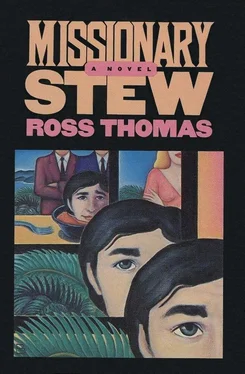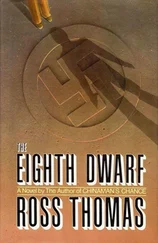Ross Thomas - Missionary Stew
Здесь есть возможность читать онлайн «Ross Thomas - Missionary Stew» весь текст электронной книги совершенно бесплатно (целиком полную версию без сокращений). В некоторых случаях можно слушать аудио, скачать через торрент в формате fb2 и присутствует краткое содержание. Город: New York, Год выпуска: 1983, ISBN: 1983, Издательство: Simon & Schuster, Жанр: Политический детектив, на английском языке. Описание произведения, (предисловие) а так же отзывы посетителей доступны на портале библиотеки ЛибКат.
- Название:Missionary Stew
- Автор:
- Издательство:Simon & Schuster
- Жанр:
- Год:1983
- Город:New York
- ISBN:978-0-671-49363-9
- Рейтинг книги:3 / 5. Голосов: 1
-
Избранное:Добавить в избранное
- Отзывы:
-
Ваша оценка:
- 60
- 1
- 2
- 3
- 4
- 5
Missionary Stew: краткое содержание, описание и аннотация
Предлагаем к чтению аннотацию, описание, краткое содержание или предисловие (зависит от того, что написал сам автор книги «Missionary Stew»). Если вы не нашли необходимую информацию о книге — напишите в комментариях, мы постараемся отыскать её.
Missionary Stew — читать онлайн бесплатно полную книгу (весь текст) целиком
Ниже представлен текст книги, разбитый по страницам. Система сохранения места последней прочитанной страницы, позволяет с удобством читать онлайн бесплатно книгу «Missionary Stew», без необходимости каждый раз заново искать на чём Вы остановились. Поставьте закладку, и сможете в любой момент перейти на страницу, на которой закончили чтение.
Интервал:
Закладка:
The marine almost smiled. “Of people in trouble, sir.”
After he talked to the marine sergeant at the reception desk and signed in, Haere waited a minute or two until a brown-haired woman in her thirties appeared, examined him briefly, introduced herself as Mrs. Crane, and asked him to please come this way. He followed her down the hall, up a flight of stairs, down another hall, and through a door into a reception room with a small desk that had her name on it. She knocked on a closed door, opened it, said, “Mr. Haere is here,” and stood aside, indicating that Haere should go in.
The man who rose from behind the almost bare metal desk wore a seersucker jacket, a tie, and a smile. It was one of those wide white almost blinding smiles that immediately generate suspicion. Haere saw that the blue eyes above the smile seemed to be smiling, too, perhaps even grinning, although with all that crinkling it was hard to tell.
The man with the smile stuck out his hand as he leaned over the desk and said, “I’m Don Merry, Mr. Haere.”
Haere shook Merry’s hand. Merry waved him to a chair, sat back down, kept on smiling, and said, “Well, now. How can I help you?”
“I arrived on the flight from Houston last night.”
Merry nodded.
“I met a doctor on the flight, a medical doctor named Blaine. James G. Blaine.”
Merry chuckled. “From Maine?”
“Kansas. He was coming down here to take over a clinic for the Friends, the Quakers.”
Again, Merry nodded. “Joe Rice’s clinic.”
“He mentioned Rice. He said they were old friends, but that Rice had disappeared.”
The smile went away and Merry looked grave, but said nothing.
“There were only five passengers on the flight,” Haere continued. “Dr. Blaine was the second one off. He was arrested when he reached the bottom of the ramp and led away by four men who looked like cops to me.” Haere paused. “I thought you should know. I might add that I find it extremely disturbing that an American medical missionary should be whisked away by the police the moment he steps off the plane. Extremely disturbing.” Listening to himself, Haere was almost satisfied with the level of his indignation.
“Excuse me a minute,” Merry said, picked up the phone, and dialed a single number. When it was answered with a faint yes, he said, “The name is James G. Blaine, supposedly a medical doctor from Kansas.” Merry looked at Haere and raised an eyebrow.
“Wichita,” Haere said.
“Wichita, Kansas,” Merry said into the phone. “You’ve got the number of the Quaker clinic over on the eastern slope, don’t you? Well, call them and see if they’re expecting the arrival of Dr. Blaine, or if he has, in fact, already arrived safe and sound. If not, call Tucaereo and see if they had a J. Blaine on yesterday’s manifest. If they did, then call our friend Suro and see if his people got their sticky mitts on the doctor and, if so, find out where they’ve stashed him. Then come tell Mr. Haere and me all about it.”
Merry hung up the phone, put his smile back on, and looked at Haere, who decided that the carefully acquired tan made the smile seem whiter than it really was. The tan went well with the crinkly eyes and the lean jaw and the straight nose. It was all capped by a thatch of ginger hair that fell down over the high forehead in a careless wave. It all seemed calculated to produce an impression of warm, quick inteligence, and Haere was quite willing to buy it if only Merry wouldn’t smile quite so often.
“Draper... Haere,” Merry said slowly, spacing the name. He frowned as if trying to remember where he had heard it before. “Politics, isn’t it?”
“Politics,” Haere agreed.
“Whatever brings you down here?”
“Vacation?”
“Here?” Merry didn’t try to hide his disbelief.
“Perhaps a little business?”
Merry shook his head as though business was simply awful. “Well, good luck is about all I can say. But if you want some advice—”
He was interrupted by the entrance of Mrs. Crane with note pad in hand. She looked at Merry, who nodded. Mrs. Crane turned to Haere.
“One,” she said. “The Friends clinic. They never heard of any Dr. Blaine, so they couldn’t be expecting him. Two, there was no J. Blaine on the Tucaereo flight from Houston yesterday — or the day before, for that matter. Three, I talked to Suro, who said he failed to arrest any gringos yesterday, although he might get around to it this afternoon after lunch.”
“Commander Suro is something of a kidder,” Merry explained.
“Yes,” Haere said. “He seems to be. So does the mysterious Dr. Blaine. What about this Dr. Rice? Has he turned up yet?”
“From where?” Mrs. Crane said.
“From wherever he disappeared to.”
“Joe Rice hasn’t disappeared anywhere,” she said. “It was Joe Rice I just talked to at the clinic.”
Chapter 29
The road that Citron followed out of the capital was a narrow blacktop, much potholed, and patched in long stretches with gravel. It led through an exurbia of shantytowns built out of scrap lumber and plastic sheeting and cardboard and flattened tin cans. The road then curved up into the mountains, where no one at all seemed to live other than a few farmers who grew straggly plots of corn and raised small herds of goats and the occasional chicken.
The sub-subsistence farms gave way to what seemed to be neglected or abandoned coffee plantations. Citron checked his odometer. At precisely 3.6 kilometers after the coffee plantations began he started looking for the side road that was marked on the rough map slipped to him by the busboy in the Inter-Continental restaurant. He almost missed the side road because it was virtually hidden by some tall broad-leafed plants. They looked like poinsettia to Citron, although they were actually higuerilla or palma Christi or, more commonly, castor-bean plants. Citron did notice they had been carefully planted to obscure the dirt side road that turned out to be not much more than a rutted path.
Citron backed up and eased the Ford slowly through the screen of broad-leafed plants, which noisily scraped against the car’s sides.After bouncing slowly along the dirt path for 1.3 kilometers, Citron stopped the car and turned off the engine.
He watched as the one-armed man stepped out from behind a clump of bushes which, for all Citron knew, were coffee plants. The man was fairly tall, at least six feet, and thin. His right arm was missing. The stump poked out from the sleeve of a clean blue T-shirt. In the man’s left hand was a pistol of some kind. Citron noted that it was a revolver. Over his eyes the man wore a pair of dark, gold-framed aviator glasses. He was a narrow-faced, grim-mouthed man, and Citron judged him to be in his middle thirties. Beneath the clean blue T-shirt was a pair of white duck pants that were soiled with smears of either dirt or oil.
The man moved slowly over to the Fiesta. The pistol was not aimed at Citron, but rather at the Fiesta itself, as if the man were prepared to kill the car should it make any sudden move. When he reached the right-hand door the man shoved the pistol down behind his belt and used his left hand to open the door. He took the pistol back out, climbed into the car, and looked at Citron.
“You are Citron?” the man said in Spanish.
“Yes.”
“I am Mr. X.” This time he said “Mr. X” in accented English.
“Right.”
“We wait.”
“For what?”
“To see if you were followed.”
“I see.”
They waited five minutes in silence. Citron found it to be a comfortable wait without strain or tension. It was, he thought, something like waiting with an old and troubled friend. Citron had often waited like this with other Mr. Eckyses in other countries until they decided to speak of their hopes and fears. Finally, the one-armed man broke the silence with an observation. “You speak very good Spanish.”
Читать дальшеИнтервал:
Закладка:
Похожие книги на «Missionary Stew»
Представляем Вашему вниманию похожие книги на «Missionary Stew» списком для выбора. Мы отобрали схожую по названию и смыслу литературу в надежде предоставить читателям больше вариантов отыскать новые, интересные, ещё непрочитанные произведения.
Обсуждение, отзывы о книге «Missionary Stew» и просто собственные мнения читателей. Оставьте ваши комментарии, напишите, что Вы думаете о произведении, его смысле или главных героях. Укажите что конкретно понравилось, а что нет, и почему Вы так считаете.












